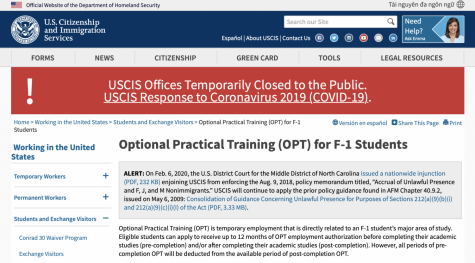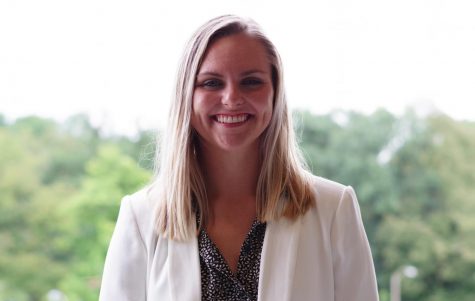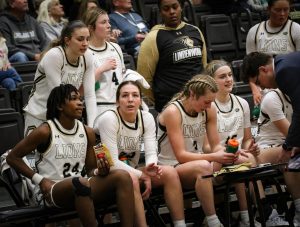COVID-19 causes uncertainty for senior international students wanting to work in the US
April 14, 2020
At the top of the U.S. Citizen and Immigration Services website, a siren red alert reads “USCIS Offices Temporarily Closed to the Public,” with a big exclamation point.
Senior Marcela Tobar, an international student from El Salvador, said the warning discouraged her from looking for information on the website about her visa.
This warning is one of several complications from the coronavirus pandemic that have made it confusing to apply for a work permit for after graduation. Although Lindenwood’s International Office has adapted its policies for the coronavirus, many applicants are still uncertain if they can get their documents and start work as planned.
Director of International Admissions Amanda Schaller said that this year, almost 80 seniors applied for Optional Practical Training. It’s called OPT for short, where international students can apply to work for one year in the U.S. after graduation.
But here’s the catch: OPT placement has to be within a student’s degree field and they should not travel outside of the U.S. while waiting for their employment authorization documents, known as EAD cards.
However, coronavirus threw a wrench in that process once Lindenwood announced it would close its campus and go online-only. In addition, the university sent a separate email to international students urging them to return home and complete classes online, which the Department of Homeland Security is allowing.

Schaller said her main job is to reduce panic right now. Despite the glaring warning on the immigration website, Schaller said OPT is “business as usual,” and the closure is just for field offices that process green cards and naturalization.
“Since things are changing so rapidly every day, we literally spend at least an hour to two a day, revising some of the guidelines and making sure that we’re up to date with the most current and accurate information coming down from immigration itself,” Schaller said.
Mailing concerns
Senior Janja Kovacic came to the U.S. from Slovenia because it was a “perfect combination” to study and bowl for Lindenwood. Since freshman year, she has planned on doing OPT.
“I know that even though I have a degree, if I just go back home, it’s not the same if you don’t have experiences,” Kovacic said.
In February, Kovacic applied for OPT. She’s since been accepted, but she cannot obtain her EAD card yet, despite knowing the government has mailed it.
Instead, Kovacic’s EAD card is most likely sitting in her campus mailbox. Many international students at Lindenwood list the university as their primary address, but campus is closed.
Schaller said the university’s mailroom is still operating and any EAD cards should be put in international admissions’ mailbox, which either she or a staff member checks twice a week.
It was not until over two weeks after campus closed that Lindenwood sent an email to students with a link to change addresses with immigration services.
For students who could not change their address before their EAD card shipped, Schaller said her office will personally forward the EAD card to the student. However, she warned that shipping a document overseas is risky.
Lost time
Mailing delays cause problems because students can work only once they have their EAD cards in hand. Typically, students set their start date for a job when applying to OPT, most before securing employment.
If a student’s work permit comes late in the mail or they aren’t able to secure a job in time, the OPT clock starts ticking and cannot be rewound from the student’s start date.
Like Kovacic, Tobar can see on her application portal that her EAD card was delivered, but she doesn’t know where it is.
Tobar said she is anxious about losing time, not because of the card coming late, but because her OPT placement is in education and schools are closed.
Tobar is studying to be an art therapist and said she already has a job lined up for her OPT. It starts July 5 with the Center for Autism Education in St. Peters, Missouri. At least, that was the original plan.
Schaller said it is still unclear whether the U.S. government will be flexible on start dates and replenish lost time because of the pandemic.
“We have a lot of higher ed administrators in the international realm who have been putting a lot of pressure on their [Customs and Border Control] reps and their USA field officers to get some clarification on that because obviously, there’s thousands of students that are in that same position right now,” she said.
U.S. Citizen and Immigration Services declined an interview with Lindenlink, citing low staff, as the office is inundated with adjustments to immigration policies.
Schaller said she hopes for a petition for extension but admitted she doesn’t know if it will happen yet. She said border closures could prevent foreign students from returning to the U.S.
”Flights… are not readily available at this point for them to even fly back,” she said.
As students wait for their documents to arrive, they are in limbo. Neither Tobar nor Kovacic can return home yet because their countries are on lockdown, so they’re staying at friends’ places for now.
“Everything is so uncertain,” Kovacic said. “And nobody knows, not even my family. They don’t know what to even suggest.”
Editor’s note: This article has been altered since it was originally published. Comments from Tobar and Lindenwood international admissions were added.











Peter Jones • Apr 14, 2020 at 9:29 pm
Sad for tober..